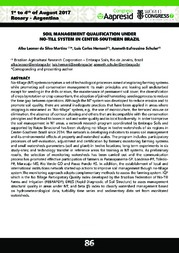Soil management qualification under no-till system in Center Southern Brazil.
Soil management qualification under no-till system in Center Southern Brazil.
Author(s): MARTINS, A. L. da S.; HERNANI, L. C.; SCHULER, A. E.
Summary: No-tillage (NT) system comprises a set of technological processes aimed at exploring farming systems while promoting soil conservation management. Its main principles are: leaving soil undisturbed except for seeding in the drills or rows, the maintenance of permanent soil cover, the diversifi cation of crops by rotation or crop consortium, the adoption of joined harvesting-seeding process to reduce the time gap between operations. Although the NT system was developed to reduce erosion and to promote soil quality, there are several inadequate practices that have been applied in areas where cropping is misnamed as "No-tillage" system, e.g., the use of monoculture, the terraces misuse or elimination, the absence of contour plowing and others that are incompatible with the conservation principles and that lead to losses in soil and water quality and in local biodiversity. In order to improve the soil management in NT areas, a network research program coordinated by Embrapa Soils and supported by Itaipu Binacional has been studying no-tillage in twelve watersheds of six regions in Center-Southern Brazil since 2014. The network is developing indicators to assess soil management and its environmental eff ects at property and watershed scales. The program includes: participatory processes of self-evaluation, adjustment and certification by farmers; monitoring farming systems and small watersheds parameters (soil and plant) in twelve locations; long term experiments in six study-sites; and technology transfer in reference areas for training in NT systems. As preliminary results, the selection of monitoring watersheds has been carried out and the communication process has promoted eff ective participation of farmers in Paranapanema-SP, Londrina-PR, Toledo- PR, Maracaju-MS, Rio Verde-GO and Passo Fundo-RS. In addition, the establishment of local and international institutions network started up actions to improve soil management though no-tillage system.The monitoring approach adopts complementary methods to assess the farming system: IQP which is the No Tillage Participatory Quality Index developed by the Brazilian Federation of No-Till Farms and Irrigation (FEBRAPDP); DRES (Rapid Diagnostic of Soil Structure) to asses management structural quality in areas under NT; and Beta (β) index to classify watershed management based on hydrometeorological data, turbidity time series and sedimentary data set from monitored watersheds.
Publication year: 2017
Types of publication: Paper in annals and proceedings
Unit: Embrapa Soils
Keywords: Plantio Direto
Observation
Some of Embrapa's publications are published as ePub files. To read them, use or download one of the following free software options to your computer or mobile device. Android: Google Play Books; IOS: iBooks; Windows and Linux: Calibre.
Access other publications
Access the Agricultural Research Database (BDPA) to consult Embrapa's full library collection and records.
Visit Embrapa Bookstore to purchase books and other publications sold by Embrapa.

